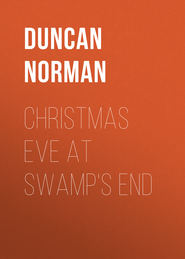По всем вопросам обращайтесь на: info@litportal.ru
(©) 2003-2024.
✖
Billy Topsail, M.D.
Настройки чтения
Размер шрифта
Высота строк
Поля
Well, now, two days later, near dusk, with Archie Armstrong on the bridge, the Rough and Tumble was crawling northwest through the first ice of the floe. An hour of drab light was left of the day – no more. And it was mean ice roundabout – small pans and a naughty mess of slush. There was a hummock or two, it might be, and a clumper or two, as well; and a man might travel that ice well enough, sore pinched by need to do so. But it was foul footing for the weight of a full-grown man, and tricky for the feet of a lad; and a man must dance a crooked course, and caper along, or perish – leap from a block that would tip and sink under his feet to a pan that would bear him up until he had time and the wit to leap again, and so come, at last, by luck and good conduct, to a pan stout enough for pause.
It was mean ice, to be sure. Yet there was a fine sign of seals drifting by. Here and there was an old dog hood on a hummock; and there and here were a harp and a whitecoat on a flat pan. But the orders of Cap'n Saul were to "leave the swiles be" – to "keep the mouths o' the guns shut" until the Rough and Tumble had run up to the herd that was coming down with the floe.
"I'll have no swiles slaughtered in play," he declared.
A gun popped forward. It was from the midst of a crowd. And Cap'n Saul leaned over the bridge-rail.
"Who done that?" he demanded.
There was no answer.
"Mm-m?" Cap'n Saul repeated. "Who done that?"
No answer.
"A dog hood lyin' dead off the port bow!" said Cap'n Saul. "Who killed un?"
Still no answer. And Cap'n Saul didn't ask again. Forthwith he stopped the ship.
"Mister Knibbs, sir," said he, to the mate, "send the crew after that dead hood."
The mate jumped.
"Cap'n Saul, sir," he replied, his eyes popping, "the ice – "
"Sir?"
"This here ice, sir – "
"Sir?"
"This here – "
"Sir?"
"This – "
"Mister Knibbs, sir," said Cap'n Saul, dryly, "this here ice is fit enough for any crew that I commands. An' if the crew isn't fit for the ice, sir, I'll soon have un so, ecod! Put un over the side. We'll waste no swiles on this v'y'ge."
"All hands, sir?"
"All hands over the side, sir, t' fetch that dead hood aboard."
Archie put in:
"May I go, Cap'n Saul?"
"No!"
"Cap'n Saul," Archie began to wheedle, "I'm so wanting to – "
"No, sir."
"I'm just crazy to – "
"'Tis no fit place for you."
"But – "
Cap'n Saul changed his mind all at once. He sent a call for Archie's old and well-tried friend, Bill o' Burnt Bay.
"Stand by the lad," said he.
"Ay, sir."
Archie left the bridge with Bill o' Burnt Bay, with whom he had sailed before. And over the side they went. And over the side went the crew for punishment. There were more than two hundred men. And not a man was spared. Cap'n Saul sent the ship's doctor after malingerers, and the mate and the haft of a sealing gaff after lurkers; and he kept them capering and balancing for dear life on that dirty floe, sopping and shivering, all in a perilous way, until dusk was in the way of catching some of them unaware.
It was then that Archie and Bill o' Burnt Bay fell in with old Jonathan Farr of Jolly Harbour. Bill o' Burnt Bay knew the old man well. And he was shocked to find him cavorting over that foul, tricky ice, with the thin blood and dry old bones he had to serve his need – a gray old dog like Jonathan Farr of Jolly Harbour, past his full labour these years gone by, gone stiff and all unfit for the labour and chances of the ice.
Still, the old man was blithe enough, as Bill marvelled to see. His eye was lit up with a flicker of fun, sparkling, somehow, through the rheum of age; and his words were mixed with laughter. They came to rest on a pan – the four of them together; old Jonathan Farr and Bill and Archie and a little lad. And Archie marked this in a glance – that the lad, whoever he was, was out of heart with the work he was at.
A good deal was to flow from that meeting; and Billy Topsail was to have a part in it all.
CHAPTER XXX
In Which a Little Song-Maker of Jolly Harbour Enlists the Affection of the Reader
"My gran'son, Bill," said Jonathan.
Archie pitied the lad – a white, soft-eyed little chap, all taut and woeful with anxiety.
"He's young for the ice," Bill observed.
"A young dog," Jonathan replied, "masters his tricks with ease."
Again Archie pitied the little fellow.
"Too young," said Bill, "for man's labour like this."
"He'll l'arn all the better for his youth."
"Time enough," Bill insisted, "two years hence."
"Ah, well, Bill," said Jonathan, then, "I wants t' see my gran'son fit an' able for his labour afore I goes my way." And he clapped the lad on the back. "Eh, Toby?" said he, heartily.
The lad was grave and mannerly.
"Ay, gran'pa," said he; "you're wonderful careful o' me, you is!"











